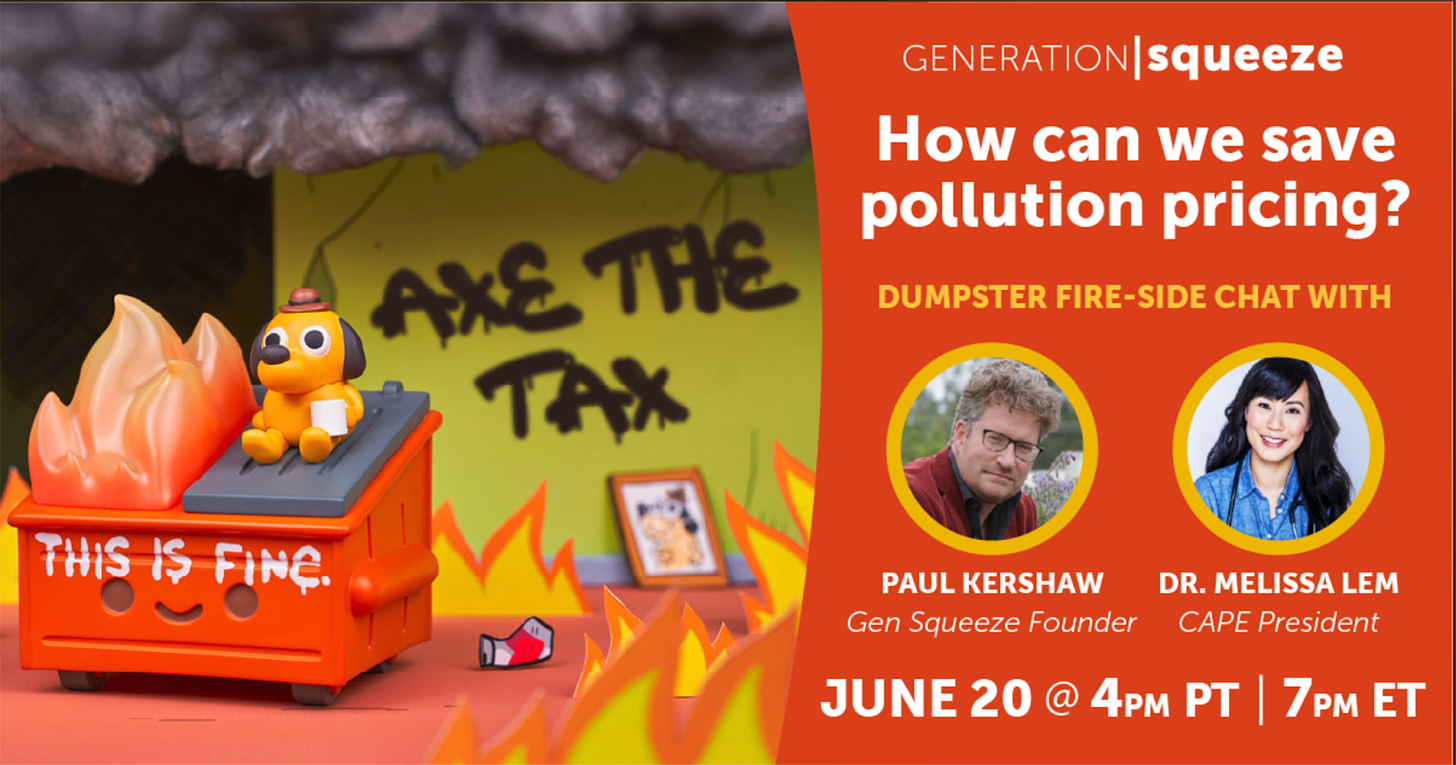It’s Time To Stop Dismissing The Concerns of Younger Canadians As ‘Whining’
Young people are adapting in the face of today’s challenges – now we need to have their backs
This week, we are excited to share a guest post by Melissa Gismondi, an award-winning writer and audio producer. But first, an important announcement for all of our supporters concerned about the escalating risks and costs of climate change.
Our next Community Call is on June 20 @ 4pm PT / 7pm ET. We’ll be discussing a controversial question that’s crucial to the health of our planet and generational fairness: How can we save pollution pricing?
Too many Canadians are blaming the carbon tax for their financial pain, jeopardizing a climate policy most of us initially supported. What’s at stake isn’t just the price of gas – or the next election. The Axe the Tax campaign risks mortgaging our kids' future.
Join Gen Squeeze Founder Dr. Paul Kershaw and Canadian Association of Physicians for the Environment President Dr. Melissa Lem for a discussion about how and why we must protect this keystone policy and other ways to tackle the root causes of climate change.
Now, for today’s story.
It’s Time To Stop Dismissing The Concerns of Younger Canadians As ‘Whining’
By Melissa Gismondi
Younger generations are facing a housing crisis, a climate crisis, a cost of living crisis. They’re dealing with stagnant wages, precarious work, and growing wealth inequality. Oh, and did we mention the loneliness epidemic? As well as lower levels of happiness for Canadians under 30 compared to older age groups?
It’ll come as no surprise to the Gen Squeeze community that these are just some of the factors harming the wellbeing of younger people. On almost every front, Canadians aged 15 to 29 aren’t doing well, concludes a September 2023 report by Statistics Canada entitled Navigating Socioeconomic Obstacles: Impact on the Well-being of Canadian Youth.
“They’ve had a hard go,” says report author Helen Foran* who spoke with Gen Squeeze Founder Paul Kershaw. “I think especially because this group hasn't been in the job market for a long time, they don't have a ton of savings to fall back on.”
According to the report, the wellbeing of younger Canadians has been declining since 2003. When home prices started surging, it put dreams of ownership at risk for those not already in the market, while also driving up rental costs. Unprecedented challenges like the COVID-19 pandemic complicated educational and work transitions and compromised mental health, in addition to driving up living costs. The rapid increase in interest rates has disproportionately harmed younger people who tend to have more debt – while many older Canadians with investments have seen both their wealth and disposable income grow.
It’s no wonder that younger Canadians report that they’re less satisfied with their lives, and less hopeful about the future – particularly among those living in the poorest households. Younger demographics as a whole face disproportionately higher levels of poverty, thanks to rising costs for things like housing, education and child care, as well as the kinds of lower-paying jobs typically open to young people. That PhD making your latte? It’s a thing.
Although some 85 indicators go into how Stats Can evaluates well-being, declining affordability is a significant one for younger Canadians because it pushes security and stability further out of reach. This has a ripple effect, making it more difficult to hit all those ‘milestone’ events, like completing a post-secondary program, getting a well-paying job, buying a home, and starting a family. What’s more, when you’re struggling to get by – or trying to figure out how you might even get by – it can be tough to think about anything else.
Behind the numbers, there are some serious consequences – not just for young people themselves, but for Canada as a whole.
Case in point: fertility. While we’ve seen an overall decline in birth rates for some time now, with younger Canadians citing affordability and housing as factors impacting decisions about whether or not to start a family. For instance, the same 2023 Stats Can report finds that 38% of Canadians aged 20 to 29 didn’t think they could afford to have a kid in the next three years.
With more young women waiting to find a stable financial footing before starting their families, it’s little wonder that places like BC also have the highest average age of birthing. The evidence suggests that changing social norms around the age of having one’s first child is tied to high living costs – including things like housing and child care.
Then of course, there's the living situation of younger people. Stats Can data show that 43% of Canadians aged 20 to 29 live with at least one of their parents. This is a change from the previous generations, who were more likely to live with significant others during their 20s. That whole fertility rate issue? It can get a bit trickier if you’re still living with mom or dad.
Declining fertility has serious implications for Canada’s finances, too.
As the number of Canadian retirees rises, so too do the costs associated with supporting and caring for our aging population. Yet at the same time, there are fewer working age adults contributing taxes to foot this growing bill. Younger people today are paying more in taxes to support their parents and grandparents than did previous generations. Canada is bringing in more immigrants to grow the tax-paying workforce, but we’re still faced with retirement income and medical costs that surpass available revenue. One result is larger government deficits – unpaid bills we leave to future younger and future generations.
Stats Can’s 2023 report also discusses young people’s mobility – or more precisely, lack thereof. Many young Canadians reported feeling like they can’t leave their current housing situation because the cost of renting a new place will likely be much higher. When moving to another apartment in the same city isn’t really an option, it’s hard to take advantage of new opportunities for work, education or even romance. In other words, it’s easy to get stuck.
If they do move, younger Canadians often have to stray further away from urban centres, putting them at risk for longer commute times. It’s no surprise then that only 55% of young Canadians – compared to 60% of middle-aged adults (30-54) and 74% of older adults (55 years and up) – reported high levels of satisfaction when it comes to where they’re living.
There are a few bright spots in these otherwise grim findings.
An overwhelming majority of younger Canadians (81%) reported having someone they could go to for support when they needed it. And let’s face it, these days, that’s probably a lot.
At the same time, the data show that younger people are resilient and able to adapt to difficult circumstances – though that might be cold comfort if you’ve got a bunch of student debt and are trying to find a decent-paying job. Adaptability and resilience are great qualities, but they shouldn’t always be what’s required. As Foran puts it, it’s still important to consider what younger Canadians actually want. How do they want to live their lives? What makes them happy? What would help them to thrive?
For Foran – who’s a member of the demographic she’s studying – the report findings didn’t really come as a surprise.
“I think in terms of what we're seeing in the news all the time, what we're hearing in our day-to-day lives, conversations with our peers, I think it's kind of clear in that sense that people are feeling discouraged and they are feeling overwhelmed by the thought of taking these big next steps, whether that's buying a house or starting a family,” Foran said.
As to whether the report brought validation or discouragement, Foran says it’s both.
“It is definitely discouraging in some ways to see this reality, but then at the same time validating, in that if you're stressed about this, there's a reason to be and you're not alone in that.”
That validation matters. Gen Squeeze has heard too many times from younger people who worry that they are failing personally when they can’t get ahead, or haven’t achieved the same life ‘milestones’ as previous generations. Our work shows that it’s not their fault. Hard work simply doesn’t pay off today the way it did in the past, so they’re starting out with the deck stacked against them.
Fortunately, we can also point the way to solutions to reverse the deteriorating wellbeing of younger people – and repair the legacy we’re leaving to those who follow in our path. With the recent federal budget organized around the theme of Fairness for Every Generation, there’s some hope that governments are feeling greater urgency to start building a Canada that works for all generations.
Do these findings from Statistics Canada sound all-too-familiar?
Your stories about struggle and adaptation are powerful in the world of politics, so we’d welcome you to share them with us. Decision-makers are often swayed more by personal experiences than by data and evidence, so we need your help to make the case for policy change.
*Helen Foran’s comments have been edited and condensed
Thanks Melissa from the Gen Squeeze team for preparing this guest post.
Melissa Gismondi is an award-winning writer and audio producer.












https://inequality.org/great-divide/to-best-understand-inequality-think-class-not-generation/
What’s going on here? We’re not suffering through a generational war. We’re continuing to live through a clash of economic classes…
Baby boomers just happened to have had the good fortune to come along at one of those rare moments in history when the richest among us were not doing so well in that clash of classes. These boomers found themselves born into a postwar America that average people — after years of struggle — had fundamentally transformed.
"just happend" does a lot of work there, for sure, but nevertheless...
I can’t afford to pay rent so will have to move back home with my dad and stepmom #2 and their 3 kids, don’t think I can get ahead in life without getting a higher paying job but my parole officer says I shouldn’t expect anyone to hire me anytime soon. Will the government make a new budget and give me money under international fairness?